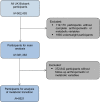Are people with metabolically healthy obesity really healthy? A prospective cohort study of 381,363 UK Biobank participants
- PMID: 34109441
- PMCID: PMC8382657
- DOI: 10.1007/s00125-021-05484-6
Are people with metabolically healthy obesity really healthy? A prospective cohort study of 381,363 UK Biobank participants
Abstract
Aims/hypothesis: People with obesity and a normal metabolic profile are sometimes referred to as having 'metabolically healthy obesity' (MHO). However, whether this group of individuals are actually 'healthy' is uncertain. This study aims to examine the associations of MHO with a wide range of obesity-related outcomes.
Methods: This is a population-based prospective cohort study of 381,363 UK Biobank participants with a median follow-up of 11.2 years. MHO was defined as having a BMI ≥ 30 kg/m2 and at least four of the six metabolically healthy criteria. Outcomes included incident diabetes and incident and fatal atherosclerotic CVD (ASCVD), heart failure (HF) and respiratory diseases.
Results: Compared with people who were not obese at baseline, those with MHO had higher incident HF (HR 1.60; 95% CI 1.45, 1.75) and respiratory disease (HR 1.20; 95% CI 1.16, 1.25) rates, but not higher ASCVD. The associations of MHO were generally weaker for fatal outcomes and only significant for all-cause (HR 1.12; 95% CI 1.04, 1.21) and HF mortality rates (HR 1.44; 95% CI 1.09, 1.89). However, when compared with people who were metabolically healthy without obesity, participants with MHO had higher rates of incident diabetes (HR 4.32; 95% CI 3.83, 4.89), ASCVD (HR 1.18; 95% CI 1.10, 1.27), HF (HR 1.76; 95% CI 1.61, 1.92), respiratory diseases (HR 1.28; 95% CI 1.24, 1.33) and all-cause mortality (HR 1.22; 95% CI 1.14, 1.31). The results with a 5 year landmark analysis were similar.
Conclusions/interpretation: Weight management should be recommended to all people with obesity, irrespective of their metabolic status, to lower risk of diabetes, ASCVD, HF and respiratory diseases. The term 'MHO' should be avoided as it is misleading and different strategies for risk stratification should be explored.
Keywords: Cardiovascular disease; Metabolically healthy obesity; Obesity.
© 2021. The Author(s).
Figures




References
-
- Kromhout D, Geleijnse JM, Boer JM, Verschuren WM. Body mass index and waist circumference predict both 10-year nonfatal and fatal cardiovascular disease risk: study conducted in 20 000 Dutch men and women aged 20–65 years. Eur J Cardiovasc Prev Rehabil. 2009;16(6):729–734. doi: 10.1097/HJR.0b013e328331dfc0. - DOI - PubMed
-
- Kim SH, Abbasi F, Reaven GM (2004) Impact of degree of obesity on surrogate estimates of insulin resistance. Diabetes Care 27(8):1998–2002. 10.2337/diacare.27.8.1998 - PubMed
Publication types
MeSH terms
Grants and funding
LinkOut - more resources
Full Text Sources
Research Materials
Miscellaneous

